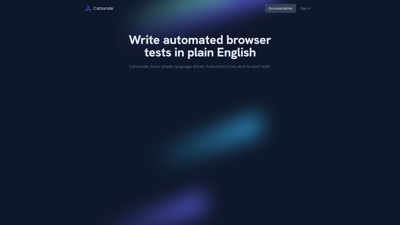Carbonate is an innovative AI-driven tool designed to streamline automated end-to-end testing. By allowing users to write tests in plain English, Carbonate transforms complex testing processes into simple, manageable tasks. This unique approach not only enhances productivity but also reduces the fragility of traditional tests, enabling developers and testing teams to focus on delivering high-quality software. With robust features like intelligent HTML analysis, caching for optimal performance, and seamless integrations with popular programming languages, Carbonate empowers teams to automate their testing workflows efficiently. Discover how Carbonate can elevate your testing strategy today!
Carbonate
Features of Carbonate
Write Automated Tests in Plain English
Carbonate allows users to create automated browser tests using simple, plain English instructions. This feature makes it accessible for both technical and non-technical users, ensuring that everyone can contribute to the testing process.
Intelligent HTML Analysis
Carbonate intelligently analyzes your HTML to differentiate between UI changes and simple rendering differences. This robustness ensures that tests remain reliable even as your UI evolves.
Performance Optimization
The tool caches generated test scripts after the first successful run, significantly speeding up subsequent test executions. This means that tests run as fast as hand-written ones, enhancing overall efficiency.
Flexibility in Test Execution
Carbonate provides the flexibility to run test scripts in any environment, allowing users to integrate their own code seamlessly between test steps. This adaptability ensures that teams can maintain control over their testing processes.
Easy Integrations
With SDKs available for PHP, Node, and Python, Carbonate can be integrated into existing test suites in minutes. This ease of integration minimizes disruption and maximizes productivity.
Empowering Testing Teams
By automating the testing workflow, Carbonate enables manual testers to focus on more complex tasks, ultimately increasing the overall effectiveness of the testing team. This empowerment leads to better bug detection and improved software quality.
Frequently Asked Questions about Carbonate
What is the difference between a cached run and an extraction?
An extraction is the initial analysis and generation of the test script, which is then cached after the first successful run. Provided that your HTML has some semantic meaning, extractions will only be necessary when you change your UI.
Won't this slow down our test suite?
Carbonate's SDK caches the generated test script directly into your test suite, meaning that on subsequent runs, it will run as fast as hand-written tests.
How can I ensure tests are reliable?
Test scripts can be committed to your repository alongside your code. If your HTML structure changes significantly, you can delete the test scripts, and Carbonate will automatically generate new ones.
What if my page is dynamically rendered?
During the initial extraction, the SDK uses a combination of DOM mutation observers and spying on your network requests to determine when a page has finished loading. On subsequent cached runs, the SDK only needs to wait until the appropriate elements are available.
Do I need coding knowledge to use this product?
You'll need to know a bit to integrate our SDK into your test suite, but it doesn't take long to get up and running. We're working on a tool that will let you run these with no integration necessary.
